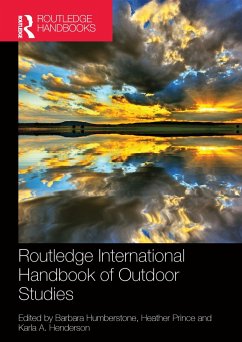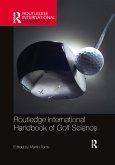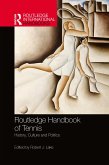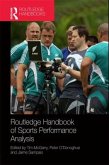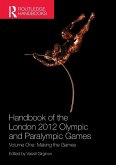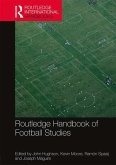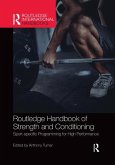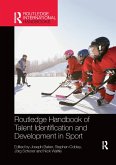Routledge International Handbook of Outdoor Studies
Herausgeber: Humberstone, Barbara; Henderson, Karla A; Prince, Heather
Routledge International Handbook of Outdoor Studies
Herausgeber: Humberstone, Barbara; Henderson, Karla A; Prince, Heather
- Broschiertes Buch
- Merkliste
- Auf die Merkliste
- Bewerten Bewerten
- Teilen
- Produkt teilen
- Produkterinnerung
- Produkterinnerung
The Routledge International Handbook of Outdoor Studies is the first book to attempt to define and survey the multi-disciplinary set of approaches that constitute the broad field of outdoor studies, including outdoor recreation, outdoor education, adventure education, environmental studies, physical culture studies and leisure studies.
Andere Kunden interessierten sich auch für
![Routledge International Handbook of Golf Science Routledge International Handbook of Golf Science]() Routledge International Handbook of Golf Science60,99 €
Routledge International Handbook of Golf Science60,99 €![Routledge Handbook of Tennis Routledge Handbook of Tennis]() Routledge Handbook of Tennis49,99 €
Routledge Handbook of Tennis49,99 €![Routledge Handbook of Sports Performance Analysis Routledge Handbook of Sports Performance Analysis]() Routledge Handbook of Sports Performance Analysis95,99 €
Routledge Handbook of Sports Performance Analysis95,99 €![Handbook of the London 2012 Olympic and Paralympic Games Handbook of the London 2012 Olympic and Paralympic Games]() Handbook of the London 2012 Olympic and Paralympic Games88,99 €
Handbook of the London 2012 Olympic and Paralympic Games88,99 €![Routledge Handbook of Football Studies Routledge Handbook of Football Studies]() Routledge Handbook of Football Studies53,99 €
Routledge Handbook of Football Studies53,99 €![Routledge Handbook of Strength and Conditioning Routledge Handbook of Strength and Conditioning]() Routledge Handbook of Strength and Conditioning65,99 €
Routledge Handbook of Strength and Conditioning65,99 €![Routledge Handbook of Talent Identification and Development in Sport Routledge Handbook of Talent Identification and Development in Sport]() Routledge Handbook of Talent Identification and Development in Sport64,99 €
Routledge Handbook of Talent Identification and Development in Sport64,99 €-
-
-
The Routledge International Handbook of Outdoor Studies is the first book to attempt to define and survey the multi-disciplinary set of approaches that constitute the broad field of outdoor studies, including outdoor recreation, outdoor education, adventure education, environmental studies, physical culture studies and leisure studies.
Hinweis: Dieser Artikel kann nur an eine deutsche Lieferadresse ausgeliefert werden.
Hinweis: Dieser Artikel kann nur an eine deutsche Lieferadresse ausgeliefert werden.
Produktdetails
- Produktdetails
- Routledge Advances in Outdoor Studies
- Verlag: Taylor & Francis Inc
- Seitenzahl: 530
- Erscheinungstermin: 8. Dezember 2017
- Englisch
- Abmessung: 246mm x 174mm x 30mm
- Gewicht: 994g
- ISBN-13: 9780815384052
- ISBN-10: 081538405X
- Artikelnr.: 51568950
- Herstellerkennzeichnung
- Libri GmbH
- Europaallee 1
- 36244 Bad Hersfeld
- gpsr@libri.de
- Routledge Advances in Outdoor Studies
- Verlag: Taylor & Francis Inc
- Seitenzahl: 530
- Erscheinungstermin: 8. Dezember 2017
- Englisch
- Abmessung: 246mm x 174mm x 30mm
- Gewicht: 994g
- ISBN-13: 9780815384052
- ISBN-10: 081538405X
- Artikelnr.: 51568950
- Herstellerkennzeichnung
- Libri GmbH
- Europaallee 1
- 36244 Bad Hersfeld
- gpsr@libri.de
Barbara Humberstone is a Professor of Sociology of Sport and Outdoor Education at Buckinghamshire New University, UK. Her research interests include: embodiment and nature-based sport, and well-being and outdoor pedagogies. She co-edited Whose Journeys? The Outdoors and Adventure as Social and Culture Phenomena (2003); Seascapes: Shaped by the Sea: Embodied Narratives and Fluid Geographies (2015) and has published papers in a variety of journals. She is Editor-in-chief of Journal of Adventure Education and Outdoor Learning and was Chair of the European Institute for Outdoor Adventure Education and Experiential Learning (2004-2008). She is a keen windsurfer, walker, swimmer and yogini Heather Prince is Associate Professor of Outdoor and Environmental Education in the Department of Science, Natural Resources and Outdoor Studies at the University of Cumbria, UK. She designs, develops and teaches on many undergraduate and postgraduate courses in Outdoor Studies and is interested in pedagogic practice in outdoor education and ecology. She is a member the Editorial Board of the Journal of Adventure Education and Outdoor Learning and loves adventuring in wild places on foot and by boat Karla A. Henderson is Professor Emeritus in the Department of Parks, Recreation and Tourism at North Carolina State University, US. Her research interests include women and social justice, physical activity, and research methods as they pertain to the outdoors and other leisure experiences. She has published in a number of journals and served as a founder for the Coalition for Education in the Outdoors and of the American Camp Association's Committee for the Advancement of Research and Evaluation. She enjoys hiking in the mountains, traveling, and playing her trumpet
Introduction Section 1: Constructs and theoretical concepts Introduction 1.
Foundation myths and the roots of adventure education in the Anglosphere 2.
A German Theory of Adventure: A view on the Erlebnispädagogik 3.
Environmental Concerns and Outdoor Studies: Nature as fosterer 4. Outdoor
Studies and a sound philosophy of experience 5. Healing the split head of
Outdoor Recreation and Outdoor Education: Revisiting Indigenous knowledge
from multiple perspectives 6. Health and wellbeing benefits of activities
in the outdoors 7. Shifting perspectives on research in the outdoors
Section 2: Formal Education in Outdoor Studies Introduction 8. The primacy
of place in education in outdoor settings 9. Scandinavian Early Childhood
Education: Spending time in the outdoors 10. Supporting early learning
outdoors in the UK: culture clash and concord 11. Curricular Outdoor
Learning in Scotland: from practice to policy 12. Teaching trainee teachers
about Outdoor Education 13. Pedagogic practice in higher education in the
UK 14. Formal curricular initiatives and evaluation in the UK Section 3:
Non-formal education and training in/for/about the outdoors Introduction
15. Careers in the outdoors 16. Beyond training for tolerance in Outdoor
Experiential Education: More than just leadership 17. Professional
accreditation in UK outdoor sector 18. Certification in outdoor programmes
19. Ethical considerations in Outdoor Studies research 20. Adventure
Education: Crucible, catalyst, and inexact 21. Challenge course
programming: On the rise or in compromise? 22. The camp experience:
Learning through the outdoors 23. Sail training 24. Forest School in the
United Kingdom 25. Adventure Therapy: Developing Therapeutic Outdoor
Practice 26. Connecting People to Experiences through Reviewing and
Reflection Section 4: International voices and cultural interpretations
Introduction 27. Inclusion of Outdoor Education in the formal school
curriculum: Singapore's journey 28. Friluftsliv: Nature friendly adventures
for all 29. Turistika activities, Dramaturgy and the Czech outdoor
experience 30. Outdoor Studies in Japan 31. Using outdoor adventure to
contribute to peace: The case of Kenya 32. Outdoor activities in Brazilian
educational camps Section 5: Social and environmental justice and Outdoor
Studies Introduction 33. Race, ethnicity, and Outdoor Studies: Trends,
challenges, and forward momentum 34. Equality and inclusion in the
outdoors: Accessing nature and the outdoors from Indian perspectives 35.
Gender in Outdoor Studies 36. Age and the outdoors 37. Disability and the
outdoors: Some considerations for inclusion 38. Spirituality and the
outdoors 39. Outdoor education, environment and sustainability. Youth,
society and environment 40. Land management and outdoor recreation in UK
Section 6: Transdisciplinary and interdisciplinary approaches to
understanding and exploring outdoor studies Introduction 41. Experiential
learning: towards a multi-disciplinary perspective 42. Enskilment and
place-responsiveness in outdoor studies: Ways of life 43. Outdoor
Education, safety, and risk in the light of serious accidents 44.
Challenges in adventures sports coaching 45. Adventure tourism 46.
Ecotourism: Outdoor Pedagogy at the Periphery 47. Bourdieu and alpine
mountaineering: the distinction of high peaks, clean lines, and pure style
48. The archaeology of the outdoor movement and the German development: In
the beginning was the curiosity about the sublime 49. Surfing, localism,
place-based pedagogies, and ecological sensibilities in Australia
Foundation myths and the roots of adventure education in the Anglosphere 2.
A German Theory of Adventure: A view on the Erlebnispädagogik 3.
Environmental Concerns and Outdoor Studies: Nature as fosterer 4. Outdoor
Studies and a sound philosophy of experience 5. Healing the split head of
Outdoor Recreation and Outdoor Education: Revisiting Indigenous knowledge
from multiple perspectives 6. Health and wellbeing benefits of activities
in the outdoors 7. Shifting perspectives on research in the outdoors
Section 2: Formal Education in Outdoor Studies Introduction 8. The primacy
of place in education in outdoor settings 9. Scandinavian Early Childhood
Education: Spending time in the outdoors 10. Supporting early learning
outdoors in the UK: culture clash and concord 11. Curricular Outdoor
Learning in Scotland: from practice to policy 12. Teaching trainee teachers
about Outdoor Education 13. Pedagogic practice in higher education in the
UK 14. Formal curricular initiatives and evaluation in the UK Section 3:
Non-formal education and training in/for/about the outdoors Introduction
15. Careers in the outdoors 16. Beyond training for tolerance in Outdoor
Experiential Education: More than just leadership 17. Professional
accreditation in UK outdoor sector 18. Certification in outdoor programmes
19. Ethical considerations in Outdoor Studies research 20. Adventure
Education: Crucible, catalyst, and inexact 21. Challenge course
programming: On the rise or in compromise? 22. The camp experience:
Learning through the outdoors 23. Sail training 24. Forest School in the
United Kingdom 25. Adventure Therapy: Developing Therapeutic Outdoor
Practice 26. Connecting People to Experiences through Reviewing and
Reflection Section 4: International voices and cultural interpretations
Introduction 27. Inclusion of Outdoor Education in the formal school
curriculum: Singapore's journey 28. Friluftsliv: Nature friendly adventures
for all 29. Turistika activities, Dramaturgy and the Czech outdoor
experience 30. Outdoor Studies in Japan 31. Using outdoor adventure to
contribute to peace: The case of Kenya 32. Outdoor activities in Brazilian
educational camps Section 5: Social and environmental justice and Outdoor
Studies Introduction 33. Race, ethnicity, and Outdoor Studies: Trends,
challenges, and forward momentum 34. Equality and inclusion in the
outdoors: Accessing nature and the outdoors from Indian perspectives 35.
Gender in Outdoor Studies 36. Age and the outdoors 37. Disability and the
outdoors: Some considerations for inclusion 38. Spirituality and the
outdoors 39. Outdoor education, environment and sustainability. Youth,
society and environment 40. Land management and outdoor recreation in UK
Section 6: Transdisciplinary and interdisciplinary approaches to
understanding and exploring outdoor studies Introduction 41. Experiential
learning: towards a multi-disciplinary perspective 42. Enskilment and
place-responsiveness in outdoor studies: Ways of life 43. Outdoor
Education, safety, and risk in the light of serious accidents 44.
Challenges in adventures sports coaching 45. Adventure tourism 46.
Ecotourism: Outdoor Pedagogy at the Periphery 47. Bourdieu and alpine
mountaineering: the distinction of high peaks, clean lines, and pure style
48. The archaeology of the outdoor movement and the German development: In
the beginning was the curiosity about the sublime 49. Surfing, localism,
place-based pedagogies, and ecological sensibilities in Australia
Introduction Section 1: Constructs and theoretical concepts Introduction 1.
Foundation myths and the roots of adventure education in the Anglosphere 2.
A German Theory of Adventure: A view on the Erlebnispädagogik 3.
Environmental Concerns and Outdoor Studies: Nature as fosterer 4. Outdoor
Studies and a sound philosophy of experience 5. Healing the split head of
Outdoor Recreation and Outdoor Education: Revisiting Indigenous knowledge
from multiple perspectives 6. Health and wellbeing benefits of activities
in the outdoors 7. Shifting perspectives on research in the outdoors
Section 2: Formal Education in Outdoor Studies Introduction 8. The primacy
of place in education in outdoor settings 9. Scandinavian Early Childhood
Education: Spending time in the outdoors 10. Supporting early learning
outdoors in the UK: culture clash and concord 11. Curricular Outdoor
Learning in Scotland: from practice to policy 12. Teaching trainee teachers
about Outdoor Education 13. Pedagogic practice in higher education in the
UK 14. Formal curricular initiatives and evaluation in the UK Section 3:
Non-formal education and training in/for/about the outdoors Introduction
15. Careers in the outdoors 16. Beyond training for tolerance in Outdoor
Experiential Education: More than just leadership 17. Professional
accreditation in UK outdoor sector 18. Certification in outdoor programmes
19. Ethical considerations in Outdoor Studies research 20. Adventure
Education: Crucible, catalyst, and inexact 21. Challenge course
programming: On the rise or in compromise? 22. The camp experience:
Learning through the outdoors 23. Sail training 24. Forest School in the
United Kingdom 25. Adventure Therapy: Developing Therapeutic Outdoor
Practice 26. Connecting People to Experiences through Reviewing and
Reflection Section 4: International voices and cultural interpretations
Introduction 27. Inclusion of Outdoor Education in the formal school
curriculum: Singapore's journey 28. Friluftsliv: Nature friendly adventures
for all 29. Turistika activities, Dramaturgy and the Czech outdoor
experience 30. Outdoor Studies in Japan 31. Using outdoor adventure to
contribute to peace: The case of Kenya 32. Outdoor activities in Brazilian
educational camps Section 5: Social and environmental justice and Outdoor
Studies Introduction 33. Race, ethnicity, and Outdoor Studies: Trends,
challenges, and forward momentum 34. Equality and inclusion in the
outdoors: Accessing nature and the outdoors from Indian perspectives 35.
Gender in Outdoor Studies 36. Age and the outdoors 37. Disability and the
outdoors: Some considerations for inclusion 38. Spirituality and the
outdoors 39. Outdoor education, environment and sustainability. Youth,
society and environment 40. Land management and outdoor recreation in UK
Section 6: Transdisciplinary and interdisciplinary approaches to
understanding and exploring outdoor studies Introduction 41. Experiential
learning: towards a multi-disciplinary perspective 42. Enskilment and
place-responsiveness in outdoor studies: Ways of life 43. Outdoor
Education, safety, and risk in the light of serious accidents 44.
Challenges in adventures sports coaching 45. Adventure tourism 46.
Ecotourism: Outdoor Pedagogy at the Periphery 47. Bourdieu and alpine
mountaineering: the distinction of high peaks, clean lines, and pure style
48. The archaeology of the outdoor movement and the German development: In
the beginning was the curiosity about the sublime 49. Surfing, localism,
place-based pedagogies, and ecological sensibilities in Australia
Foundation myths and the roots of adventure education in the Anglosphere 2.
A German Theory of Adventure: A view on the Erlebnispädagogik 3.
Environmental Concerns and Outdoor Studies: Nature as fosterer 4. Outdoor
Studies and a sound philosophy of experience 5. Healing the split head of
Outdoor Recreation and Outdoor Education: Revisiting Indigenous knowledge
from multiple perspectives 6. Health and wellbeing benefits of activities
in the outdoors 7. Shifting perspectives on research in the outdoors
Section 2: Formal Education in Outdoor Studies Introduction 8. The primacy
of place in education in outdoor settings 9. Scandinavian Early Childhood
Education: Spending time in the outdoors 10. Supporting early learning
outdoors in the UK: culture clash and concord 11. Curricular Outdoor
Learning in Scotland: from practice to policy 12. Teaching trainee teachers
about Outdoor Education 13. Pedagogic practice in higher education in the
UK 14. Formal curricular initiatives and evaluation in the UK Section 3:
Non-formal education and training in/for/about the outdoors Introduction
15. Careers in the outdoors 16. Beyond training for tolerance in Outdoor
Experiential Education: More than just leadership 17. Professional
accreditation in UK outdoor sector 18. Certification in outdoor programmes
19. Ethical considerations in Outdoor Studies research 20. Adventure
Education: Crucible, catalyst, and inexact 21. Challenge course
programming: On the rise or in compromise? 22. The camp experience:
Learning through the outdoors 23. Sail training 24. Forest School in the
United Kingdom 25. Adventure Therapy: Developing Therapeutic Outdoor
Practice 26. Connecting People to Experiences through Reviewing and
Reflection Section 4: International voices and cultural interpretations
Introduction 27. Inclusion of Outdoor Education in the formal school
curriculum: Singapore's journey 28. Friluftsliv: Nature friendly adventures
for all 29. Turistika activities, Dramaturgy and the Czech outdoor
experience 30. Outdoor Studies in Japan 31. Using outdoor adventure to
contribute to peace: The case of Kenya 32. Outdoor activities in Brazilian
educational camps Section 5: Social and environmental justice and Outdoor
Studies Introduction 33. Race, ethnicity, and Outdoor Studies: Trends,
challenges, and forward momentum 34. Equality and inclusion in the
outdoors: Accessing nature and the outdoors from Indian perspectives 35.
Gender in Outdoor Studies 36. Age and the outdoors 37. Disability and the
outdoors: Some considerations for inclusion 38. Spirituality and the
outdoors 39. Outdoor education, environment and sustainability. Youth,
society and environment 40. Land management and outdoor recreation in UK
Section 6: Transdisciplinary and interdisciplinary approaches to
understanding and exploring outdoor studies Introduction 41. Experiential
learning: towards a multi-disciplinary perspective 42. Enskilment and
place-responsiveness in outdoor studies: Ways of life 43. Outdoor
Education, safety, and risk in the light of serious accidents 44.
Challenges in adventures sports coaching 45. Adventure tourism 46.
Ecotourism: Outdoor Pedagogy at the Periphery 47. Bourdieu and alpine
mountaineering: the distinction of high peaks, clean lines, and pure style
48. The archaeology of the outdoor movement and the German development: In
the beginning was the curiosity about the sublime 49. Surfing, localism,
place-based pedagogies, and ecological sensibilities in Australia

